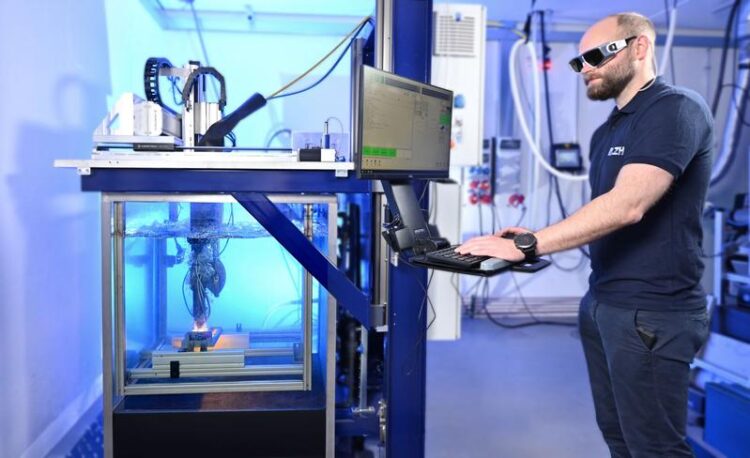Laser for more sustainability

Laser under water: The LZH is developing an automated process for cleaning ship hulls.
Photo: LZH
LZH schowcases innovations at Hannover Messe…
Whether it’s cleaning ships under water, microstructuring skis or additive manufacturing: At the Hannover Messe from April 22 to 26, 2024, Laser Zentrum Hannover e.V. (LZH) will be demonstrating the many ways in which lasers can be used for greater sustainability. The LZH will be exhibiting at the Lower Saxony Pavilion in Hall 2, Stand A10.

The LZH presents skis with an innovative microstructure at the Hannover Messe. Photo: LZH
Laser-based processes open new ways to tackle environmental impacts: LZH scientists are working with partners to develop a method for automated underwater cleaning of ship hulls by using lasers. Biofouling, the marine growth of shells and algae on ship hulls, increases the flow resistance of ships, leading to higher fuel consumption and emissions. The new process is intended to reduce the time ships spend in dock.
Laser processing head for coaxial deposition welding
Laser-based processes can make production more efficient and sustainable. Additive manufacturing processes, for example, can save material and, depending on the application, also energy. The LZH’s latest laser processing head for coaxial deposition welding clearly demonstrates how additive manufacturing can supplement or replace conventional processes, whether in the production of components, their modification, or their repair. For example, highly stressed components can be provided with a protective coating using wire deposition welding.
Micro material processing with the laser
Lasers can be used to specifically modify surface properties for a wide range of applications. One example is skis with innovative microstructures: they reduce friction and ensure higher speeds when skiing, even without the now-banned fluorine-containing ski wax that was used in professional sports. LZH scientists have developed a method to use lasers to process the curved ski surfaces.
Niedersachsen ADDITIV: The SME partner for 3D printing
Niedersachsen ADDITIV focuses on the transfer of research. The project supports companies that want to integrate 3D printing into their production or develop it further in a practical and needs-oriented manner – free of charge and independent of manufacturers. At the Hannover Messe, the experts from Niedersachsen ADDITIV will be presenting their services for companies from Lower Saxony in Hall 16 at the Lower Saxony Pavilion “Digitisation” (Stand F11).
LZH partner of Technology & Business Cooperation Days
LZH is partner and co-organizer of the Technology & Business Cooperation Days of the Enterprise Europe Network (EEN), which take place during the Hannover Messe. At the networking event, companies, start-ups and research institutions can connect, exchange ideas and thus find partners for business, technology or research cooperation. Registration for the Technology & Business Cooperation Days is free of charge and possible until April 8, 2024.
Weitere Informationen:
https://www.lzh.de/en/press-releases/2024/laser-more-sustainability-lzh-schowcas…
Media Contact
All latest news from the category: Materials Sciences
Materials management deals with the research, development, manufacturing and processing of raw and industrial materials. Key aspects here are biological and medical issues, which play an increasingly important role in this field.
innovations-report offers in-depth articles related to the development and application of materials and the structure and properties of new materials.
Newest articles

A blueprint for mapping melting ice sheets
Researchers in the Stanford Radio Glaciology lab use radio waves to understand rapidly changing ice sheets and their contributions to global sea-level rise. This technique has revealed groundwater beneath Greenland,…

Water hyacinth plant pots – utilization of an invasive species
Together with Fiber Engineering GmbH, the DITF presents a process for the production of biodegradable plant pots. The products are cost effective and competitive. At the same time, the production…

Current research on the new 6G mobile communications standard
Nursing care robots, autonomous driving, digital twins: all of these high-tech applications will play an essential role for the new 6G mobile communications standard. The first commercial 6G networks are…



